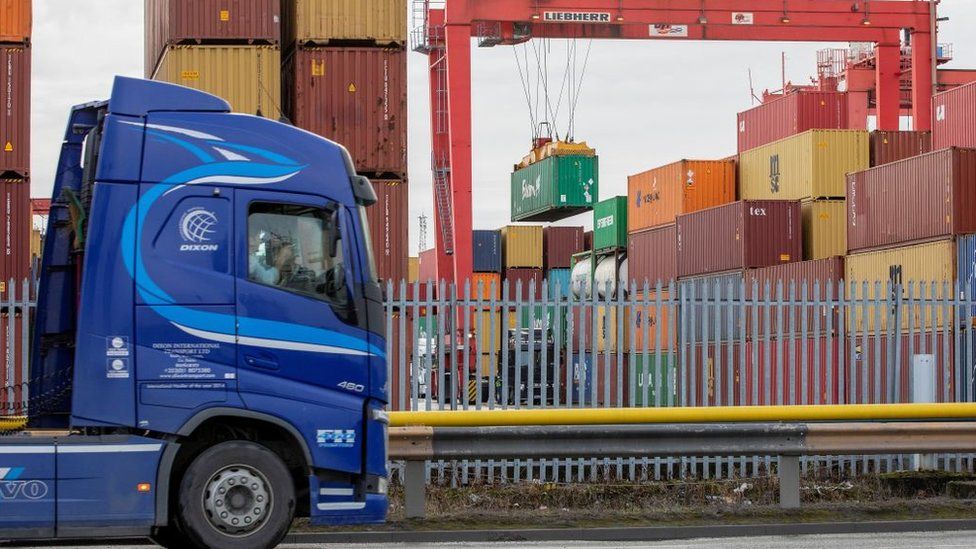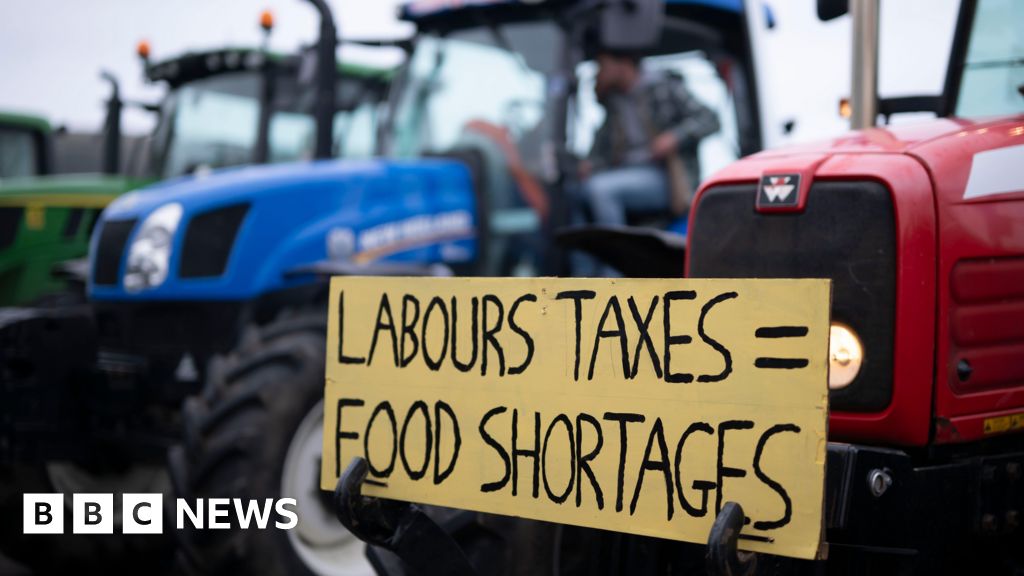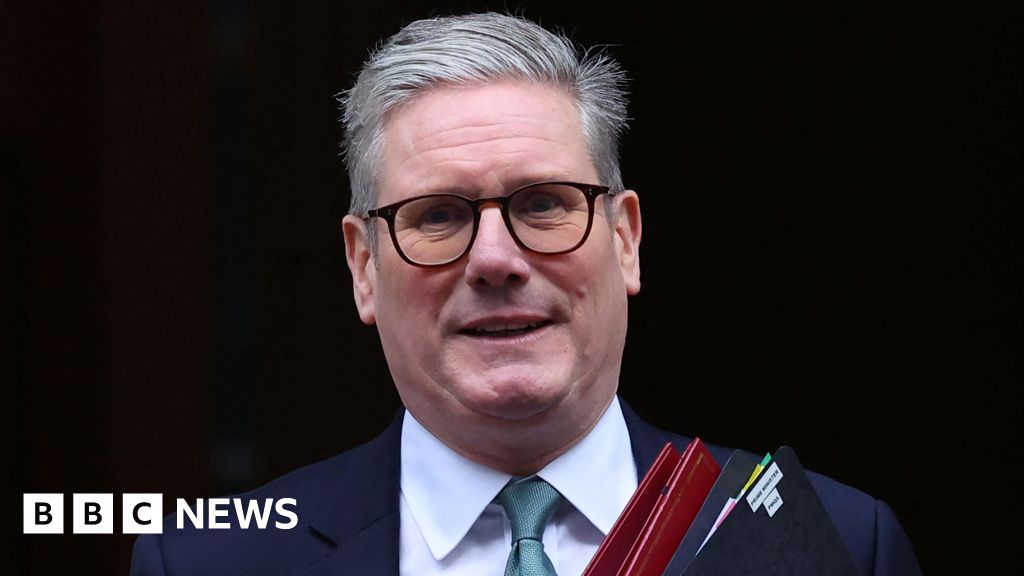ARTICLE AD BOX
 Image source, Getty Images
Image source, Getty Images
The Northern Ireland Protocol allows goods to be transported across the Irish land border without the need for checks
By John Campbell
BBC News NI economics and business editor
The UK and EU are on the brink of an agreement which would reform the Northern Ireland Protocol.
The protocol is the part of the Brexit deal which sets Northern Ireland's trade rules.
It keeps Northern Ireland inside the EU's single market for goods. That keeps the Irish land border open but means products arriving into NI from the rest of the UK are subject to checks and controls.
What should you look out for in the new deal?
How green is the green lane?
The UK and EU have long agreed that British goods which are staying in Northern Ireland should be subject to fewer checks and controls than products which are going to be moved across the border into the Republic of Ireland.
They are set to agree that this can be done using the concept of green lanes and red lanes.
British goods which are staying in Northern Ireland would use the green lane at NI ports, meaning they wouldn't have to be checked and would require minimal paperwork.
Goods which are due to travel into Ireland would use the red lane meaning they would face customs processes and other checks at NI ports.
It is expected that companies will need to be registered as trusted traders to use the green lane.
Companies will want to know what the initial and ongoing requirements are to qualify as a trusted trader.
There is also the question of who will need to be a trusted trader: The GB exporter? The Northern Ireland importer? The haulier carrying the goods? Or all three?
A key issue for business is the extent to which the green lane will reduce the need for customs paperwork.
For most businesses in Northern Ireland the physical checking of goods has not been the major impact of the protocol, it has been the added bureaucracy.
They will want the green lane to reduce that to the greatest extent possible.
There is also the question of whether the UK government will continue funding the Trader Support Service which helps with the paperwork.
Will there be anything new on medicines?
Last year the EU acknowledged that the protocol, as originally agreed, would cause too much disruption to the supply of medicines to NI.
It changed some of its laws in an attempt to guarantee the supply of medicines from GB to Northern Ireland.
But on Friday a House of Lords committee warned there were still some outstanding issues - will these be addressed by a new agreement?
The protocol should have meant that parcels being sent from GB suppliers to NI consumers would require a customs declaration.
That has never been implemented due to a so-called "grace period."
Will a new deal make that "grace period" permanent or come up with some other solution?
Will all VAT powers return to the UK government?
The protocol means that EU Value Added Tax and excise rules for goods generally apply in NI.
That means changes to UK VAT rates don't automatically apply. fFor example, a VAT cut on environmental goods like domestic solar panels has not been applied in Northern Ireland.
Sky News has reported that the deal will include the UK retaking VAT powers in NI - but will that be a comprehensive change or will it apply to a limited class of goods?
What role for the European Court of Justice?
The EU has been clear that any protocol disputes which involve a matter of EU law should ultimately be settled by the ECJ.
The UK wants the ECJ to be put at arms length, with mechanisms to ensure it rarely gets involved.
How will this balance be struck? Will there be a role for independent arbitrators and the Northern Ireland courts?
What is the Northern Ireland Protocol?
The Northern Ireland Protocol is a trading arrangement, negotiated during Brexit talks. It allows goods to be transported across the Irish land border without the need for checks.
Before Brexit, it was easy to transport goods across this border because both sides followed the same EU rules. After the UK left, special trading arrangements were needed because Northern Ireland has a land border with the Republic of Ireland, which is part of the EU.
The EU has strict food rules and requires border checks when certain goods - such as milk and eggs - arrive from non-EU countries.
The land border is a sensitive issue because of Northern Ireland's troubled political history. It was feared that cameras or border posts - as part of these checks - could lead to instability.
The UK and the EU agreed that protecting the Northern Ireland peace deal - the Good Friday agreement - was an absolute priority.
So, both sides signed the Northern Ireland Protocol as part of the Brexit withdrawal agreement.
It is now part of international law.
What say for Stormont?
The protocol means that a significant chunk of EU law continues to apply in Northern Ireland and any amendments to these laws must automatically apply.
If new laws are being added to the protocol this must be agreed with the UK government through a body called the Joint Committee.
As Northern Ireland is not an EU member state it does not have a formal way to influence EU rules.
Image source, Getty/Charles McQuillan
Image caption,How much of a say will Stormont have?
The protocol provides various discussion forums which are mostly UK to EU, though the UK can invite Northern Ireland representatives.
There is near consensus across Northern Ireland political parties and business groups that there should a more meaningful role of Stormont to address this "democratic deficit."
The EU has previously proposed the creations of new forums to give stakeholders like business and civic groups a 'structured dialogue' with EU officials.
Will a new deal move further than this?
Will Stormont politicians and officials have a greater consultative input when the EU is drafting laws which will impact Northern Ireland?

 1 year ago
17
1 year ago
17








 English (US)
English (US)